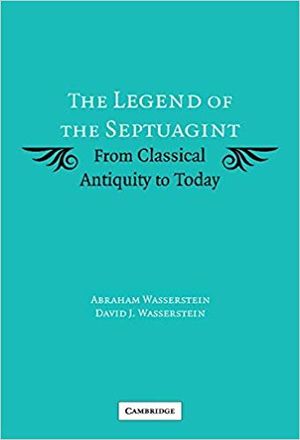The Legend of the Septuagint (2006 Wasserstein, Wasserstein), book
The Legend of the Septuagint: From Classical Antiquity to Today (2006) is a book by Abraham Wasserstein and David Wasserstein.
Abstract
"The Septuagint is the most influential of the Greek versions of the Torah, the first five books of the Hebrew Bible. The exact circumstances of its creation are uncertain, but different versions of a legend about the miraculous nature of the translation have existed since antiquity. Beginning in the Letter of Aristeas, the legend describes how Ptolemy Philadelphus commissioned seventy-two Jewish scribes to translate the sacred Hebrew scriptures for his famous library in Alexandria. Subsequent variations on the story recount how the scribes, working independently, produced word-for-word, identical Greek versions. In the course of the following centuries, to our own time, the story has been adapted and changed by Jews, Christians, Muslims and pagans for many different reasons: to tell a story, to explain historical events and to lend authority to the Greek text for the institutions that used it. This book offers the first account of all of these versions over the last two millennia, providing a history of the uses and abuses of the legend in various cultures around the Mediterranean."--Publisher description.
Editions and translations
Published in Cambridge [England]: Cambridge University Press, 2006.
Contents
- The letter of Aristeas
- The Hellenistic Jewish tradition
- The rabbis and the Greek Bible
- The Ptolemaic changes
- The church fathers and the translation of the Septuagint
- Among the Christians in the Orient
- The Muslims and the Septuagint
- Yosippon and the story of the seventy
- Karaites, Samaritans and Rabbanite Jews in the Middle Ages
- The Septuagint in the Renaissance and the modern world.
External links
- [ Google Books]
